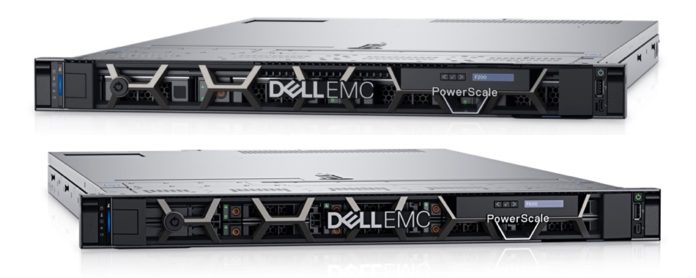Dell has updated its Isilon scale-out filers with new PowerScale branding and products as well as S3 object access and a DataIQ data analytics feature.
PowerScale is the brand that Dell deputy chairman Jeff Clarke referred to in comments about the coming Unstructured.NEXT product in the Q1 earnings call in May, calling it “the last of the powering up of the portfolio.”
Dan Inbar, GM and president for Storage at Dell, issued a quote: “The amount of unstructured data enterprises store as file or object storage is expected to triple by 2024, and there are no signs of it slowing.”
Dell has now, following on from the PowerStore launch, completed its Power-branding of its storage products. It has two unstructured data storage products: Isilon for files and ECS for object storage.
By adding S3 object access to v9.0 of the PowerScale OneFS operating system, the way is paved for a unified Isilon/ECS product line. However, ECS and Isilon are not coming together yet, with ECS meant for purpose-built object stores.
Hardware
There are two PowerScale models, both all-flash and 1U in size, and each based on a Dell PowerEdge server – the F200 SAS drive system and the F600 all-NVMe drive system. The existing Isilon range has three product classes covering a high performance to high capacity spectrum:
- All-flash nodes – F800 and F810 (basically F800 + deduplication)
- Hybrid flash/disk nodes – H600, H500, H5600 and H400
- Nearline and Archive filers – A200 and A2000 for cool and cold data.
The PowerScale F200 and F600 fit in the all-flash node category and slot in below the F800 in capacity terms.
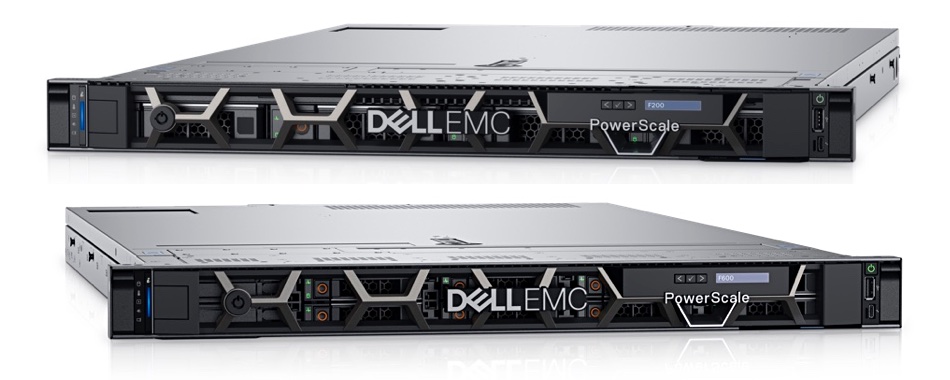
The F200, a single CPU socket system with just 4 SSDs (960GB, 1.92TB, 3.84TB) and 3.84TB to 15.36TB capacity, is aimed at Internet edge, remote and branch office (ROBO) deployments.
The F600 is a higher performing system with two CPU sockets, 8 drives (1.92TB, 3.84TB, 7.68TB) and a 15.36TB to 61.44TB capacity range. Its processing power supports OneFS deduplication and compression and it could go in larger ROBO sites and in data centres for media and entertainment workloads.
There can be from 3 to 252 of these systems in a cluster and they can be mixed and matched with existing Isilon clusters.
In comparison the F800, with a Xeon E5-2697A v4 CPU, is much higher capacity, supporting 60 SAS SSDs (1.6TB, 3.2TB, 3.84TB, 7.68TB, 15.36TB) with a 96TB to 924TB range.
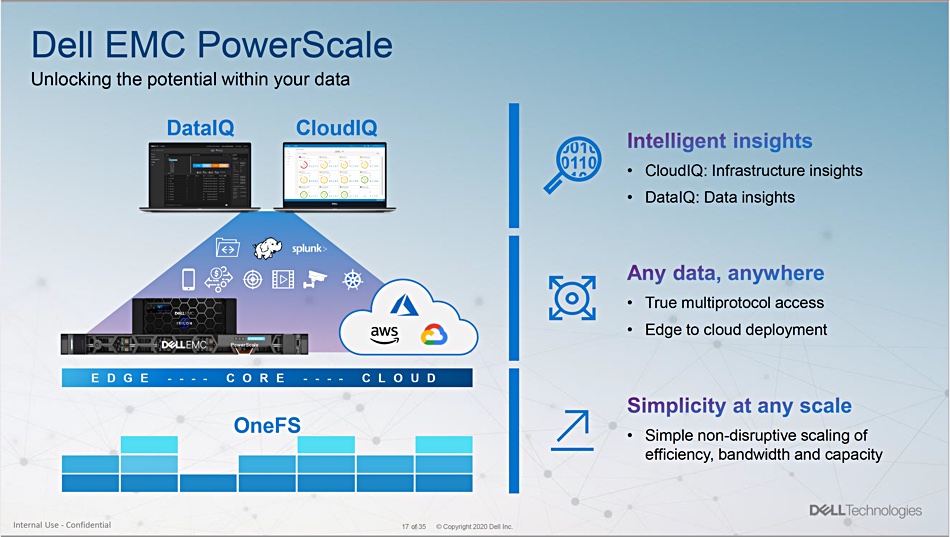
Performance
Dell has not released specific PowerScale product performance numbers or even released details of the actual CPUs used. However, it has said the v9 PowerScale OneFS can deliver up to 15.8 million IOPS and the new PowerScale nodes (F200 and F600) are up to 5x faster than “its predecessor,” without specifying the predecessor. We think it is the F800.
We know the F800 provides up to 250,000 IOPS and 15GB/sec throughput as a single node, and we can compare F200 and F600 attributes to that.
The F200 with just one CPU and 4 SAS drives supports 2 x 10/25GbitE network links whereas the F800, with its 60 drives and single CPU, supports 2 x 10/25/40 GbitE. We suspect the F200 will be slower than the F800.
The F800 can have up to 256GB of memory for its CPU to handle the 60 SAS SSDs, but the F600, with just 8 x NVMe SSDs (faster than SAS), has up to 384GB of memory; 50 per cent more DRAM for 86 per cent fewer drives. It also supports 2 x 10/25/100 GbitE networking, more than the F800’s 40GbitE top end.
The F600’s superiority in CPU socket number, DRAM capacity, SSD speed, and IO port bandwidth suggests that its IOPS and throughput numbers will be significantly higher than those for the F800. In fact we think the F600 will deliver 5x more performance than the F800, meaning 1.25 million IOPS and more throughput as well. A literal 5x throughput improvement would mean 75GB/sec but we think this could be unrealistic.
Operating System
The F200 and F600 are supported by v9 of the (PowerScale) OneFS operating system, codenamed Cascades. It runs on all existing Isilon nodes as well. This version adds S3 object access to existing support for NFS, SMB and HDFS.
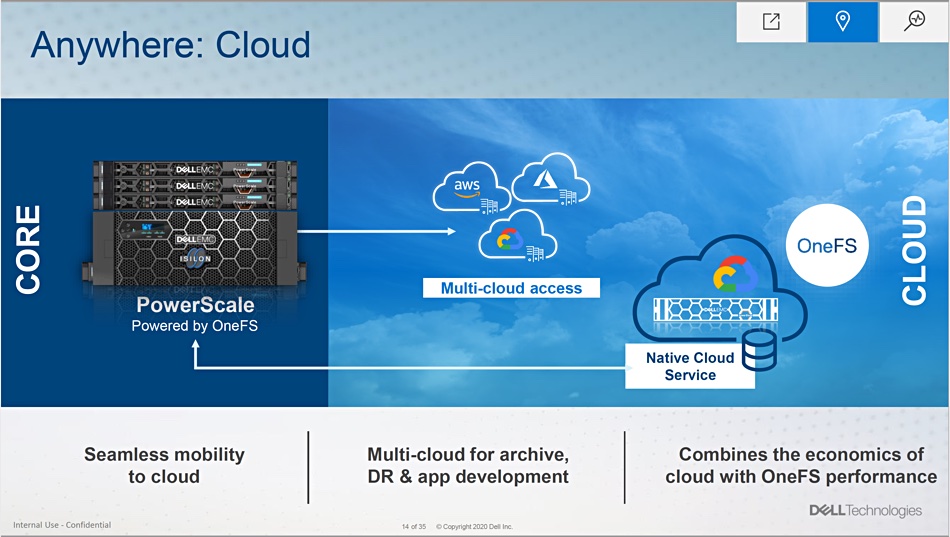
All data on the system can be simultaneously read and written through any protocol.
Data reduction has been improved to make it up to 6x better than the previous OS version, delivering an effective increase in capacity for existing Isilon nodes supporting data reduction, such as the F810.
OneFS v9.0 supports clusters with up to 60PB of raw capacity; an immense amount. New nodes can be added to a cluster and brought online in a claimed 60 seconds. Then the data load across the cluster can be automatically rebalanced to relieve hot spots. Old nodes can be decommissioned with no downtime.
There are new Ansible and Kubernetes integrations to make PowerScale better suited for DevOps work.
PowerScale OneFS can also run in the AWS, Azure and Google clouds, enabling a single environment across Internet Edge, ROBO, data centre and public cloud locations.
DataIQ
DataIQ software provides a single view of file and object data across Dell EMC (including Unity), third-party and public cloud storage. This heterogeneous file and object environment can be scanned, searched, classified, tags added to items, and data automatically moved according to policies.
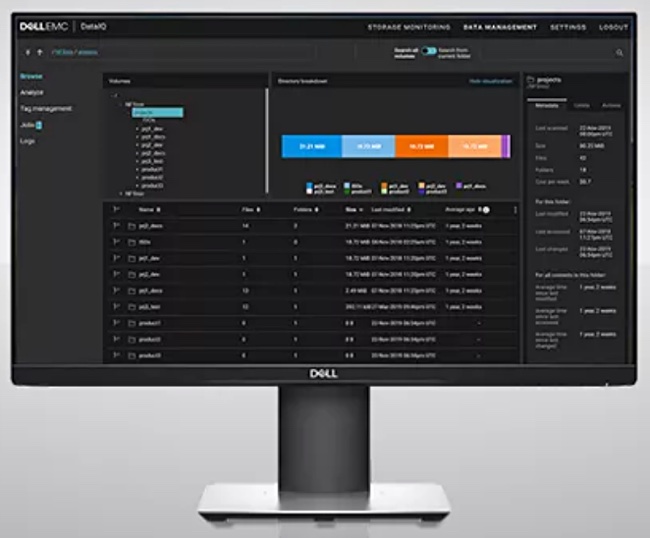
That means the data is known about and can be stored in the most cost-effective system for its access level. It also allows for self-service or automated movement of data between file and object stores, and between on-premises and public cloud locations. Data can also be moved between PowerScale and ECS systems.
DataIQ provides reporting on data usage, storage costs, user access patterns and more.
Data items of different types can be grouped into a project with tags and then such projects dealt with as single entities. We could envisage a film project with associated file components which can be managed as a single item and moved from one system to another.
DataIQ gives Dell a foothold in the heterogeneous data management space, enabling it to start competing with other file data managers such as InfiniteIO and Komprise. It is also included with PowerScale giving Dell an effectively instant customer base.
A duplicate finder plugin locates redundant data across volumes and folders, enabling users to delete duplicates, save costs and streamline their storage infrastructure. That brings Dell into the copy data management space as well.
PowerScale systems, like other Dell storage products, can be managed through the CloudIQ monitoring and predictive analytics service.
We understand Dell is considering OEMing OneFS. Having it available on PowerEdge servers would help enable this.
Dell PowerScale OneFS v9.0, PowerScale product nodes and DataIQ are now generally available globally. Existing Isilon and ECS products remain supported.


